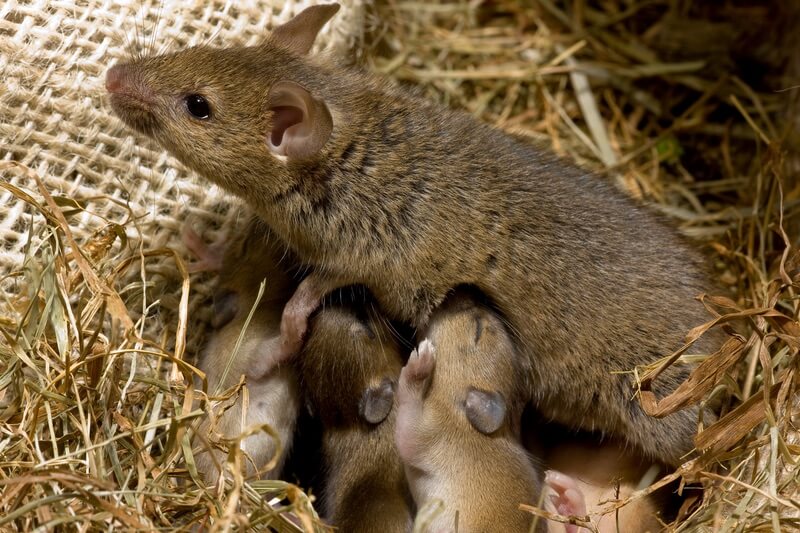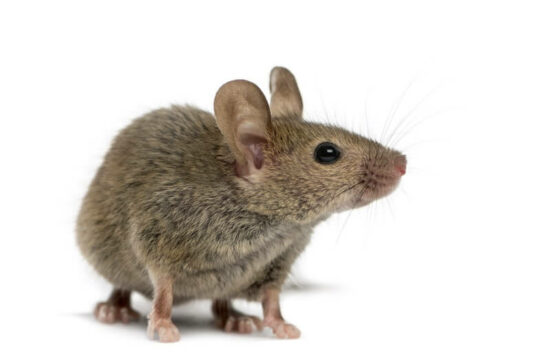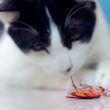If you’ve ever had mice in your home, you’ve probably wondered if they’ll return to a disturbed nest or not.
This guide will teach you everything you need to know about mouse behavior (especially the mothers) when it comes to a nest that has been disturbed.
Let’s get started!
Table of Contents
Will Mice Return To A Disturbed Nest?
Mice are one of the most hated pests in a home. While not as bad as large rats, mice can be just as troublesome.
They have a knack for reproducing like crazy. Not only that, but mice can build nests, cause destruction in their wake, and even spread diseases. The latter issue is the most problematic, and it’s why you should never let infestations go unaddressed.
It’s very likely that you’ll encounter a mouse nest in your home at some point. If that’s the case, the clear thing to do is remove the nest (we’ll get into how you can do that safely later).
But one question many homeowners have is will mice return to a disturbed nest? The answer might surprise you!
Believe it or not, mice often do return to their nests even after you’ve disturbed them. They might wait things out elsewhere for a while. But once things seem safe, many will return to the nest.
That’s not always the case, but it is pretty common. A few factors could affect whether a mouse returns to a disturbed nest or not.
The most significant consideration is safety. Mice are prey animals which means they’re targets for many predators. Even other rodents will try to kill and eat these little critters!
If a predator completely overtakes the nest, the chances of the mouse returning are slim. The same goes for any nest in a location that’s no longer safe. Mice are eager to return to the nest they built, but they’re not stupid!
Ultimately, mice weigh the risks to determine whether it’s worth returning to a disturbed nest or starting something new. Why assess the risk at all? It comes down to the time and resources the rodent puts into the nest.
It’s not easy finding a safe place to call home. When a mouse finds a suitable spot that’s comfortable, close to food and water, and safe, they’re not keen on losing it. They’ll wait until the coast is clear, but when they have the opening to return to a disturbed nest, they’ll take it!
The same goes for well-established nests. Building a nest out of nothing is more work than most humans realize. The mice have to source ingredients while dodging predators and detection. A nest that’s been around for a long time will likely see reoccupation in the future.
Mice don’t want to see that hard work go to waste!
Will A Mother Come Back For Babies?
With how often mice have babies, it’s hard to imagine that they have strong maternal instincts. However, you might be surprised to learn that mice are very good parents!
Mothers are highly dedicated to their youngs’ safety. They develop strong bonds, and adults can recognize their mothers their entire lives!
The sheer commitment the mice mothers have is endearing, but it can create a nightmare regarding pest control.
If you disturb or even move a nest with babies, there’s a good chance that the mother will come back for her babies. They use their impeccable sense of smell to establish a trail and find their way back to the babies.
There are a few exceptions for female mice. It’s rare, but some mothers might abandon their babies if they didn’t have the greatest experience as young.
The maternal bond isn’t guaranteed. If, for whatever reason, a baby mouse doesn’t spend a lot of time with their mother, they don’t understand the closeness that others have with their young. As a result, they become less-than-stellar mothers when it’s their turn to have babies.

It’s an ugly cycle of abandonment; Those mothers are more likely to leave babies behind for their own safety.
Those instances are rare, but they do occur.
Overall, it’s safe to assume that mothers will come back for babies (even if the next is disturbed). Even encountering a nest without a mother is uncommon. Mothers rarely leave the side of their young.
The only time they spend apart is when the mother goes out to source food.
What To Do If You Find A Mouse Nest
With mice being so keen on returning to even disturbed nests, you have to be extra careful when encountering one. Simply destroying the nest won’t do you any good. To see actual results, you must take extra steps.
1. Put On Protection
First and foremost, put on some protection.
Mice can carry a wide range of diseases and parasites. Even coming into contact with the nest puts you at risk. Never grab onto a nest with your bare hands.
Plus, there’s the risk of getting bit if a mouse hides where you can’t see them.
At the very least, you need durable gloves to handle the nest. Don’t let identifiable materials fool you. There could be waste, saliva, and other virus-carrying fluids in the material.
It’s also a good idea to wear a mask. Bits and pieces could go airborne, and that’s not something you want to inhale.
2. Place The Nest In A Sealed Container
Before you disturb the nest and take action, grab yourself a sealed container.
You have many options here. You can use a plastic tub of the appropriate size, a work bucket with a lid, or even a sealable food container! The most important thing is that the container seals shut.
Mice often create scent trails back to the nest. Even if they leave in a hurry, they can use that scent trail to find their way back several days later (even if the nest is disturbed). Sealing the nest will disrupt the trail and make it more challenging for the mouse to return.
Ideally, you’ll use a container with tall sides. Smaller options will do if you’re in a pickle, but tall buckets are best. That way, the container can prevent any live mice from scurrying out.
When you’re ready, grab onto the nest with your gloved hand. Be very careful when doing this, and make sure to look for any signs of life. You can still move a nest with babies or live mice in it.
But it’s best to leave that to the professionals when possible. If you’re not comfortable taking action with live mice as part of the equation, back off and abandon your efforts for now.
If the nest is empty, pick it up with your gloved hand and quickly pop it into the container. Put the lid on, seal it shut, and put the entire thing into a large garbage bag for good measure.
3. Dispose Of The Entire Container
Your job’s not over just yet.
Because mice often return to a disturbed nest, you’ll need to dispose of it. Even when the nest is sealed, mice can use an established scent trail to return to the nest’s general area. Disposing of the home’s remnants will ensure that mice move on.
Here’s the thing about mice nests: You can’t just toss them in your trash can.
Remember: these nests are filthy. They might not look too bad to the naked eye. But they are likely full of bacteria, viruses, parasites, and other nasty issues that could put your health at risk.
Tossing the nest and container into your standard trash indoors isn’t a good idea. It could lead to the spread of disease.
The best thing you can do is either dump it in the forest away from your home or put it directly in your dumpster.
Conclusion
Now that you know if mice will return to a disturbed nest or not, you can take action and plan accordingly when getting rid of nests.
If you have any questions about the process or nesting behavior of these critters, send us a message! We’re always happy to help.


